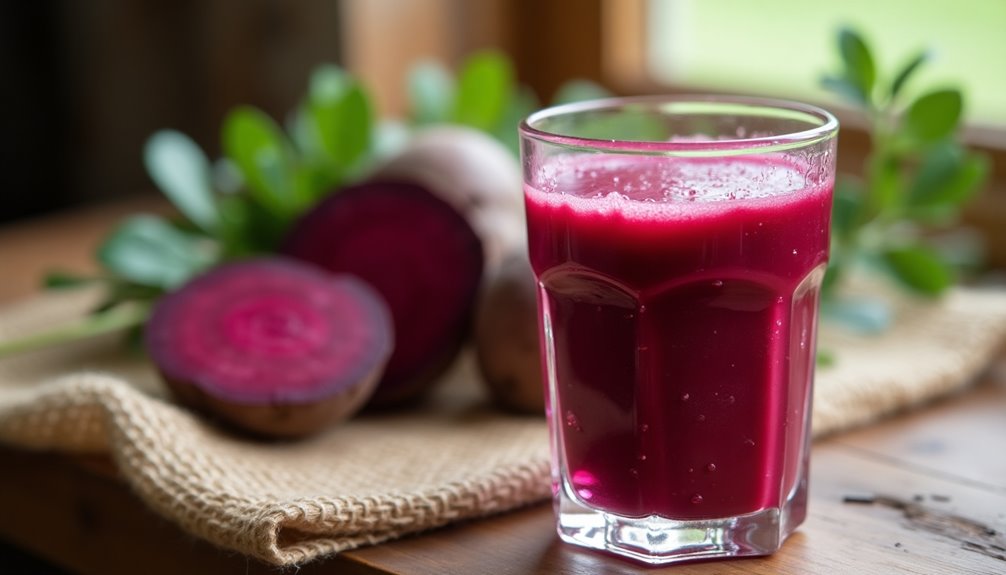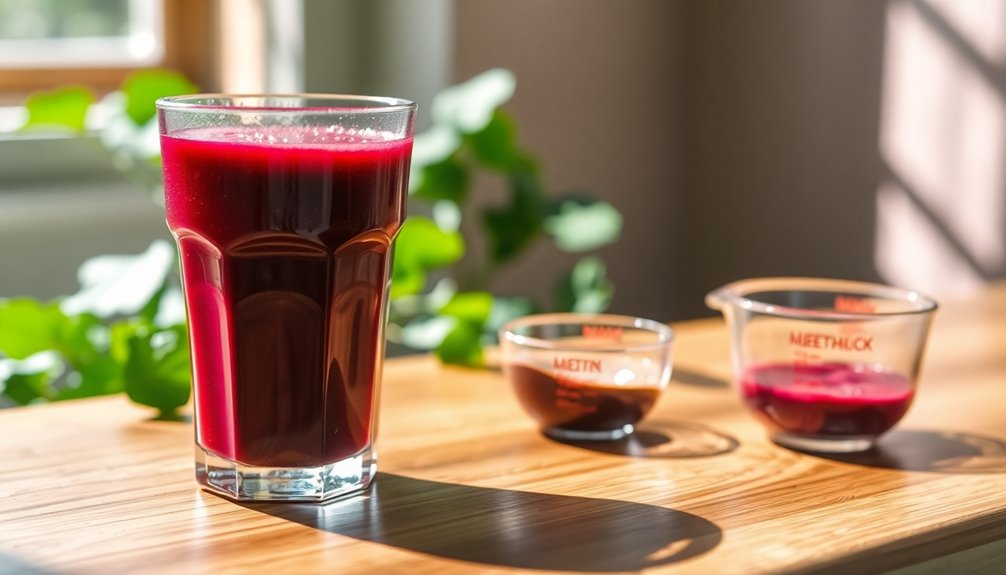Beet juice stays in your system for up to 24 hours. You'll notice significant effects about 6 hours after drinking it, as nitrate levels peak during that time. The duration of these benefits can vary based on your metabolism and how often you consume beet juice. If you're consistent, you may experience enhanced performance over time. Curious about how to maximize the effects or any other details? There's more to uncover on this topic!
Key Takeaways
- Beet juice is absorbed into the bloodstream within 2 to 3 hours of consumption.
- Nitrate levels significantly increase after drinking beet juice and can last for about 6 hours.
- The effects of beet juice can last up to 12 to 24 hours, varying by individual metabolism.
- Regular consumption helps maintain performance benefits and enhances overall effects over time.
- Beeturia, the red discoloration of urine, can appear within 2 to 4 hours after drinking beet juice.

Have you ever wondered how long beet juice actually lingers in your system? You’re not alone in this curiosity, especially if you’ve jumped on the beet juice bandwagon for its impressive health benefits. Many people are eager to understand how long beet juice stays active in their bodies, particularly due to its potential to enhance athletic performance and improve cardiovascular health. Research indicates that the nitric oxide, which is produced from the nitrates in beet juice, can remain effective for several hours after consumption, providing a boost in energy and endurance. However, individual factors such as metabolism and overall diet can influence this duration, making it fascinating to explore the various ways our bodies respond to this vibrant drink.
When you consume beet juice, it's quickly absorbed into your bloodstream within just 2 to 3 hours. This rapid absorption leads to a significant increase in nitrate levels, which is one of the main reasons people turn to beet juice for enhancing athletic performance.
After you drink beet juice, the elevated nitrate levels can stick around for about 6 hours before they return to baseline. This means that if you're looking to boost your performance during a workout, timing your consumption is key. You'd want to enjoy that vibrant red juice a few hours before you hit the gym to maximize its effects.
However, the benefits don't stop there. The impact of beet juice can persist for up to 12 to 24 hours post-consumption, depending on your individual metabolism and digestive transit time. So, if you're consistent with your intake, you might find that regular consumption helps you maintain those performance benefits over time.
One fascinating phenomenon that often arises with beet juice consumption is beeturia, or the discoloration of your urine. You might notice a red color in your urine within 2 to 4 hours after drinking beet juice. This occurs due to the excretion of betalains, the pigments responsible for the deep red hue of beets.
It's a harmless effect, but it can certainly catch you off guard if you're not expecting it! Just remember, this discoloration is a sign that your body is processing the nutrients from the beet juice, and it's completely normal.
If you're considering making beet juice a regular part of your routine, there's a strategy to maximize its benefits. Pre-loading with beet juice over a period of 3 to 6 days can significantly enhance its positive effects on your physical performance.
This means drinking beet juice consistently during this time will allow your body to build up those nitrate levels, making the most out of your workouts.
Frequently Asked Questions
How Long Does It Take for Beetroot Juice to Leave Your System?
When you drink beetroot juice, it typically leaves your system within 12 to 24 hours.
You'll notice the effects, like increased nitrate levels, peaking around 2 to 3 hours after consumption and gradually returning to baseline.
If you experience beeturia, the discoloration of your urine, that can last up to 48 hours, depending on your digestion.
Regularly consuming beetroot juice can build up nitrate levels, enhancing benefits over time.
Can Beet Juice Show up in Your Stool?
Yes, beet juice can show up in your stool. If you consume it, you might notice reddish or pink stool within 12 to 24 hours.
This color change is due to the pigment betanin and usually lasts up to 48 hours, depending on your digestive system. However, not everyone experiences this; only about 10% to 14% of people do.
If the discoloration persists without beet consumption, consider consulting a healthcare provider.
How Long Does It Take to Digest Beetroot Juice?
When you drink beetroot juice, it usually takes about 2 to 4 hours for your body to start digesting it.
You'll often notice its pigments in your urine within that timeframe.
Depending on your unique digestive health and metabolism, the bright red color can linger, sometimes appearing in your urine or stool for up to 48 hours.
Staying hydrated and maintaining good digestive health can influence how quickly you process it.
What Happens 3 Hours After Eating Beets?
About three hours after eating beets, your body starts absorbing nitrates into your bloodstream. This process can enhance your exercise performance by improving muscle contractility and increasing blood flow.
You might notice a change in your urine color too, as betalains, the pigments in beets, begin to be excreted. If you see a pinkish or reddish hue, that's a sign your body's efficiently processing those vibrant nutrients.
Conclusion
In the grand tapestry of health, beet juice weaves its vibrant threads, staying in your system for about 24 hours. Just like the fleeting beauty of a sunset, its benefits may linger, enhancing your vitality and performance. Embrace this ruby elixir, knowing that each sip nourishes your body and spirit. As you reflect on the day's journey, remember that even the smallest choices can illuminate your path to wellness, much like the stars that guide you home.
Cindy thoroughly researches juicing trends, techniques, and recipes to provide readers with practical advice and inspiration. Her writing style is accessible, engaging, and designed to make complex concepts easy to understand. Cindy’s dedication to promoting the advantages of juicing shines through her work, empowering readers to make positive changes in their lives through the simple act of juicing.

















